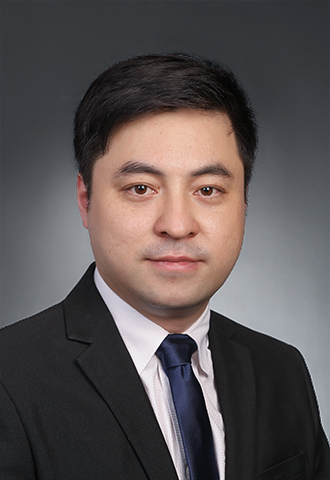-

- Chen Dongxiao
- Senior Research Fellow
- Institute for International Strategic Studies
-

- Lu Chuanying
- Senior Research Fellow
- Center for American Studies
- Institute for Global Governance Studies
- China's specific security review on overseas-bound data
- China's top internet regulator mulls more specific security review on overseas-bound data
- Prof. Lu Chuanying interviewed by CGTN on Data Security
- Prof. Lu Chuanying interviewed by SCMP on cybersecurity review
- Prof. Lu Chuanying interviewed by SCMP on cross-border data flow and cyber security
- How to Make a Truly Democratic and ...
- China can inject new dynamics into ...
- BRICS can lead Global South
- How G20 meeting could defuse world ...
- ‘Belt and Road’ initiative must wor...
- China’s Foreign Policy under Presid...
- Criticism of CPEC is proof of progr...
- Can China help shape global governa...
- The Contexts of and Roads towards t...
- Seeking for the International Relat...
- Fostering the cross-border infrastr...
- The Belt and Road Initiative and Th...
- Wuhan 2.0: a Chinese assessment
- The Establishment of the Informal M...
- Identifying and Addressing Major Is...
- Identifying and Addressing Major Is...
- “Polar Silk Road”and China-Nordic C...
- Identifying and Addressing Major Is...
- Opportunities and Challenges of Joi...
- Wuhan 2.0: a Chinese assessment
- G20 Development Agenda and 2030 Age...
- BRI in Oman as an example: The Syn...
- Coronavirus Battle in China: Proces...
- China’s Fight Against COVID-19 Epid...
- Revitalize China’s Economy:Winning ...
- International Cooperation for the C...
- Working Together with One Heart: P...
- The Tragedy of Missed Opportunities
- The Tragedy of More Missed Opportun...
- The US Initiatives in Response to C...
The COVID-19 pandemic is both a world health crisis and a stress test for global health cooperation, exposing a glaring deficit in global health governance. As the virus continues its march across the world, it is time for the world to build an effective and resilient global public health system.
LEADERSHIP, COORDINATION, AND GOVERNANCE IN SHORT SUPPLY
The crisis has revealed a global health leadership vacuum. Given the limited resources at its disposal and even less political support from national governments, the World Health Organization (WHO) is unable to fulfill its anticipated role of leading international antivirus efforts. In the absence of effective multilateral coordination in a global pandemic, governments are obliged to rely on themselves; countries with limited health resources and capabilities are largely left to their own devices.
International containment efforts are undermined by virus-induced politicization and stigmatization.The spread of a largely unknown respiratory virus has far outpaced traditional containment efforts. Conspiracy theories about it only fan the flames of racism and xenophobia. The blame game and finger pointing have poisoned great power relations, further hobbling global antivirus efforts and potentially sparking broad and deep economic and social crises.
Science is being subordinated by politics. A science-based approach is critical to containment efforts against infectious diseases. In the current crisis, however, scientific knowledge and advice have been neither fully respected nor heeded. Political, economic, and security considerations have led to suboptimal policies and caused immeasurable losses.
Megacity health systems are under strain, further undermining containment efforts. Increasing population density and mobility resulting from deepening globalization are presenting new challenges for pandemic containment. Although megacities have advanced health-care services and public health emergency capabilities, decision-makers need to fully consider the political, economic, social, and security ramifications of any major restrictive measures amid health emergencies, making city governance all the more difficult in times of crisis.
ELEMENTS OF AN EFFECTIVE AND RESILIENT HEALTH COOPERATION FRAMEWORK
The world needs an updated global health security concept. Infectious diseases may be caused by environmental change and pathogens, but their extent and magnitude are exacerbated by an outdated health security concept and the absence of effective health cooperation. In a globalized world, no country can stay immune to a global pandemic or fight one alone. The world is in dire need of an updated global health security concept to help overcome the cycle of neglect and panic. Health security for all humanity can only be achieved when nations can act on an urgent sense of shared fate, mutual obligations, and greater solidarity.
Nations should reaffirm the centrality of the United Nations and the WHO and further empower them to create an effective and robust public health governance architecture. In a world of proliferating public health threats, it takes considerable strategic foresight and political will on the part of national leaders to erect a robust governance architecture in which extensive and effective health coopera- tion can be carried out under the principles of equality and mutual respect. A global health security strategy is needed whereby policies and mechanisms for global health crises can be established through consultation and coordination. The centrality of the United Nations and the WHO, its specialized health agency, should be reaffirmed and further empowered in global health governance. Simultaneously, new channels for global health cooperation should be explored. The leadership vacuum must be filled to facilitate collective action on epidemic prevention, monitoring, and response.
Nations should enhance the WHO’s International Health Regulations (IHR) to strengthen national public health capabilities. Given the complexities of the global health landscape, the IHR needs to be revised to strengthen its enforcement mechanisms. National governments should honor their commitments under the IHR by increasing health investments and personnel training, improving interagency coordination, establishing new health partnerships, and enhancing health emergency preparedness. The United Nations and its specialized agencies should increase financial and technical assistance to developing countries, just as developed countries and the developing world need to overcome their disagreements to jointly build a robust global public health system.
Nations should improve funding mechanisms for global public health. Inadequate funding is an outstanding problem for global health security and a major contributing factor to inadequate emergency preparedness in low- and middle-income countries. Funding mechanisms need to be put in place to increase investments in national public health security in such nations. At the same time, a global public health emergency reserve fund and corresponding rapid disbursement mechanism should be set up to facilitate rapid response and early intervention in the event of a major health emergency.
The WHO should strengthen monitoring, warning, and joint responses to global health threats. The WHO’s Global Outbreak Alert and Response Network initiative (GOARN) should be improved to pave the way for a global public health emergency alert and response system so that monitoring and information sharing can be conducted on a global scale to foster closer international coordination. Meanwhile, a health emergency joint-action program should be established for global health emergencies, under which national contingents of first responders can conduct joint simulation exercises on a regular basis to evaluate national, regional, and global preparedness and response capabilities. To improve the efficiency of such a program, related deployment and authorization mechanisms need to be introduced so that multilateral assistance will be readily available when cross-border and global health crises occur.
Countries should optimize their public health resource reserves and allocation systems to build a worldwide medical product stockpile and resilient supply chain. Public health resources should be increased to create a global strategic stockpile. At the same time, the world also needs a reliable and resilient global medical product supply chain. It should be coupled with sound logistics and management to ensure the worldwide availability of urgently needed medical materials in the event of a health crisis. International scientific collaboration should be increased to facilitate technological innova- tion in drug resistance research. Countries should establish a public health technology bank to ensure the reliable supply of diagnostic kits, vaccines, and treatments.
The COVID-19 pandemic has proven once again that all nations share weal and woe. China should continue to support the WHO’s active leadership in the global coronavirus combat, and stand ready to work with the health body and other countries to make greater contributions to global health security.
Source of documents:Council on Foreign Relations, May 2020
